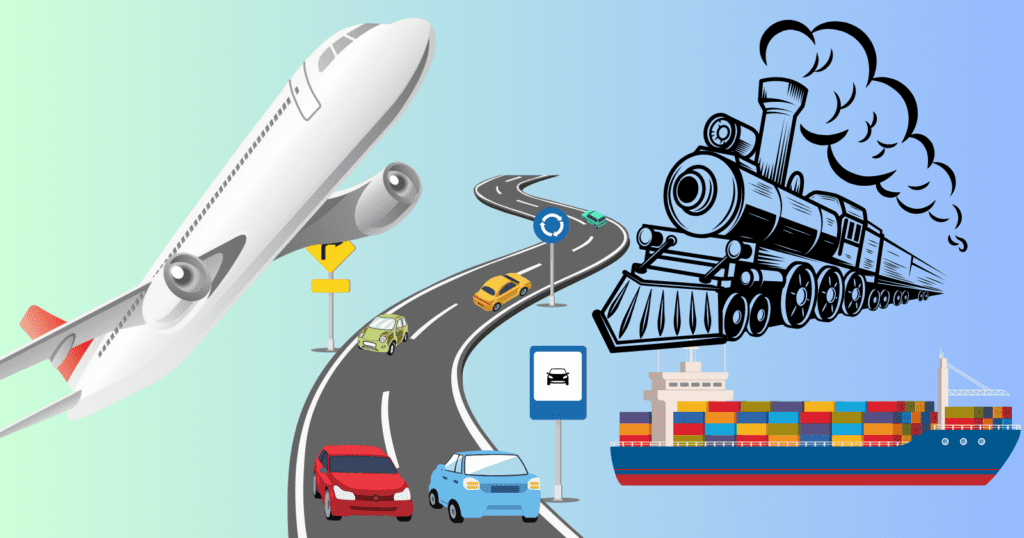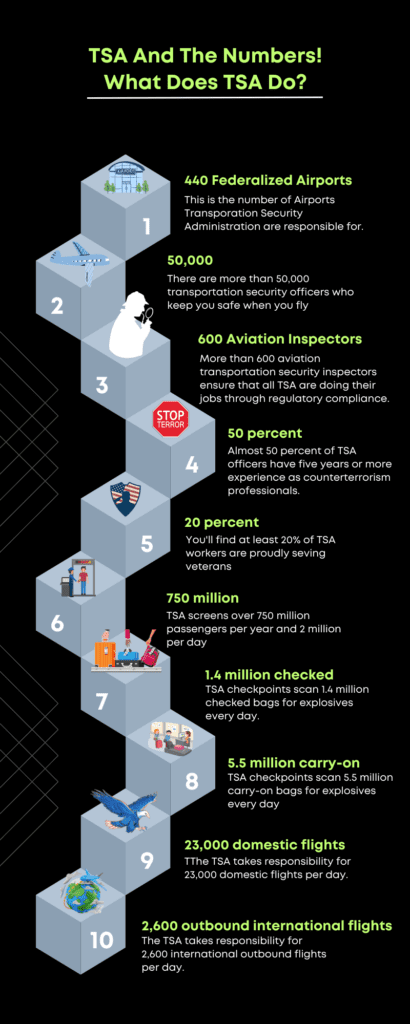Transportation security has become a well-known name among flyers, and understanding what is transportation security responsible for can better help us navigate security checkpoints.
With the increasing terrorist threats affecting airlines, there is a greater need to ensure the safety and security of passengers who fly the great blue skies. I have researched TSA inside and out, flown frequently, and encountered smooth flying as well as challenges, and I am here to share my findings with you.
In this article, we will discuss various aspects of transportation security, from their responsibilities to key agencies that affect the rules and the future of this critical sector. Together, let’s navigate what is transportation security responsible for to better understand the process.
The Role Of Transportation Security In Various Modes Of Transportation
Let’s talk about the main role of TSA, and then we will dive deeper and break it down.
Main Role Of TSA
The main responsibility of the transportation security administration is toprovide police protection for airline passengers.Maintain secure flight schedules for the airlines.Make sure planes are mechanically ready for flying.Screen passengers for weapons and explosives.
Now that’s a mouthful all run together, so let’s break it down.
Provide Police Protection
While TSA agents are not law enforcement officers, they can search your bags, and if anything illegal is found, they will call in the local law agency.
Secure Flight Schedules
TSA prescreens passengers to determine high-risk and low-risk persons before they board the flight.
Mechanically Ready Planes
TSA does not directly check for mechanical issues with planes, but it is their job to make sure all planes coming and going are on the manifest and secure all airport parameters. They are trained to report any suspicious activity.
Screen For Weapons And Explosives
TSA scans all passengers with the use of millimeter wave advanced imaging technology and walk-through metal detectors to find concealed weapons and substances that may be used in explosives.
Other Roles Of TSA
We discussed the main role of TSA, so now let’s talk about TSA in other transportation areas.
Air Transportation
When considering what is transportation security responsible for, one of the most prominent areas is air transportation. Airport security measures include passenger and baggage screening, access control to restricted areas, and perimeter security. These measures ensure that the millions of passengers traveling by air daily are safe from potential threats.
Maritime Transportation
In the maritime sector, the question of what is transportation security responsible for involves securing ports, vessels, and cargo. Port security includes access control, cargo screening, and monitoring vessel movements. Vessel security measures encompass onboard security procedures, crew training, and communication with port authorities.
Rail Transportation
In the realm of rail transportation, understanding what is transportation security responsible for entails examining train station security, passenger and luggage screening, and security measures onboard trains. In addition, rail transportation security includes ensuring that stations have appropriate surveillance and access control systems, as well as implementing protocols to handle emergencies and threats.
Road Transportation
For road transportation, what is transportation security responsible for involves ensuring the safety of buses, coaches, and cargo vehicles? Road transportation security includes:
- Vehicle inspections.
- Secure transport of valuable cargo.
- The establishment of vehicular checkpoints to deter potential threats.

Key Agencies And Organizations Involved In Transportation Security
When discussing what is transportation security responsible for, it is crucial to acknowledge the key agencies and organizations involved. These include:
Transportation Security Administration (TSA)
The TSA secures the United States transportation systems, focusing primarily on air travel. In addition, the TSA ensures that passengers, cargo, and infrastructure are safe from threats, a crucial part of what is transportation security responsible for.
Department Of Homeland Security (DHS)
The DHS coordinates and oversees transportation security in the United States. It works closely with other agencies to ensure the safety of travelers and transport infrastructure, playing a vital role in determining what is transportation security responsible for.
International Maritime Organization (IMO)
The IMO is responsible for developing and implementing international standards for maritime security. Its work encompasses port and vessel security, as well as the safety of navigation, an essential aspect of what is transportation security responsible for in the maritime sector.
International Civil Aviation Organization (ICAO)
The ICAO sets global standards for aviation security, including passenger and cargo screening and aircraft security. Therefore, understanding what is transportation security responsible for in the aviation sector requires acknowledging the role of the ICAO in setting and enforcing these standards.
National And Regional Transportation Security Agencies
Various national and regional agencies contribute to transportation security, addressing the question of what is transportation security responsible for in their respective jurisdictions.
Transportation Security Technology And Innovations
In exploring what is transportation security responsible for, we must consider the role of technology and innovation. Advances in these areas have enhanced the capabilities of security agencies, improving the effectiveness of their efforts.
Advanced Imaging Technology (AIT)
AIT is used in airport passenger screening, offering a more thorough and efficient method of detecting potential threats. This technology is a crucial component of what is transportation security responsible for in the aviation sector.

Explosives Detection Systems (EDS)
EDS screens luggage and cargo for the presence of explosives, playing an essential role in what is transportation security responsible for. These systems help to ensure the safety of passengers, crew, and cargo by detecting potential threats before they can cause harm.
Biometrics And Facial Recognition Technology
Biometrics and facial recognition technology enhance security in transportation systems. By verifying identities using unique physical characteristics, these technologies contribute to what is transportation security responsible for by providing additional layers of security and streamlining the screening process.
Cybersecurity Measures
As transportation systems become more reliant on digital technologies, addressing cybersecurity concerns has become an essential aspect of what is transportation security responsible for. Protecting digital infrastructure and data from cyber threats is crucial for maintaining the overall safety and integrity of transportation systems.
Integration Of Machine Learning Artificial Intelligence In Transportation Security
Artificial intelligence (AI) and machine learning help to enhance transportation security. These technologies can help security agencies analyze large volumes of data, identify patterns, and predict potential threats, thus contributing to what is transportation security responsible for.
Challenges And Issues In Transportation Security
Despite advancements in technology and security protocols, there remain several challenges and issues when it comes to understanding what is transportation security responsible for:
Balancing Security And Passenger Privacy
Striking the right balance between ensuring security and preserving passenger privacy is a significant challenge in transportation security. Therefore, it is crucial to develop security measures that protect travelers without infringing on their privacy rights.
AddressingHhuman Error And Insider Threats
Human error and insider threats pose significant challenges to transportation security. Ensuring the proper training and vetting of security personnel is critical to mitigate these risks and maintain the effectiveness of what is transportation security responsible for.
The Evolving Nature Of Threats And Terrorism
Terrorism and other threats to transportation systems constantly evolve, requiring security agencies to stay abreast of new techniques and tactics. Adapting to these changing threats is a vital aspect of what is transportation security responsible for.
Funding And Resource Constraints
Adequate funding and resources are necessary for transportation security agencies to fulfill their responsibilities. However, budget constraints and competing priorities can limit the capabilities of these organizations and impact what is transportation security responsible for.
Impact Of Global Pandemics And Other Crises On Transportation Security
Global pandemics and other crises can disrupt transportation systems and affect security measures. Responding to these challenges and ensuring the continuity of transportation security efforts is an essential part of what is transportation security responsible for.
The Future Of Transportation Security
As we look ahead, several factors will shape the future of what is transportation security responsible for:
The Role Of Public-Private Partnerships
Public-private partnerships will likely play an increasingly important role in transportation security, with private companies collaborating with government agencies to develop innovative security solutions.
Enhancing International Cooperation And Coordination
Greater international cooperation and coordination will be essential for addressing the global nature of transportation security threats. Sharing information, resources, and best practices will be critical to ensuring the effectiveness of what is transportation security responsible for.
Embracing Technology To Improve Efficiency And Effectiveness
The integration of advanced technologies, such as AI, machine learning, and biometrics, will continue to drive improvements in transportation security, enhancing the capabilities of security agencies and shaping what is transportation security responsible for.
The Importance Of Continuous Training And Development For Security Personnel
Investing in the continuous training and development of security personnel ensures they remain prepared to face evolving threats and challenges.
The Potential Impact Of Emerging Transportation Technologies On Security
New transportation technologies like autonomous vehicles and drones will likely introduce new security challenges and considerations. Therefore, adapting to these emerging technologies will be an essential aspect of what is transportation security responsible for in the future.

FAQs About What Is Transportation Security Responsible For?
We have gathered three frequently asked questions about what is Transportation Security responsible for.
What are some of the key agencies involved in transportation security?
Some of the key agencies involved in transportation security include:
Transportation Security Administration (TSA), Department of Homeland Security (DHS), International Maritime Organization (IMO), International Civil Aviation Organization (ICAO), and various national and regional transportation security agencies. These organizations play critical roles in establishing and enforcing security measures and standards across different modes of transportation.
How has technology impacted transportation security?
Technological advancements have significantly impacted transportation security by providing innovative solutions for enhancing safety and efficiency. In addition, these technologies have improved the capabilities of security agencies, enabling them to better protect passengers, crew, and cargo.
What challenges do transportation security agencies face in the future?
Transportation security agencies face several challenges in the future, including:
- Balancing security and passenger privacy
- Addressing human error and insider threats
- Adapting to evolving threats
- Terrorism
- Securing adequate funding and resources
- Responding to global pandemics and other crises.
Additional Resources
If you are looking for more tutorials, walkthroughs, and troubleshooting on TSA, here are some additional posts about TSA:
Conclusion
We must understand what is transportation security responsible for to ensure passengers, crew, and cargo across various modes of transportation are safe and secure. As threats evolve and new challenges emerge, transportation security agencies must remain vigilant, adaptive, and collaborative to protect the public.
Embracing technological advancements, enhancing international cooperation, and investing in the continuous training and development of security personnel will be vital to addressing the question of what is transportation security responsible for in the years to come.
By staying informed and engaged in transportation security discussions, individuals and businesses can support ongoing efforts to maintain safe and secure transportation systems worldwide.
Happy travels, my friends.
